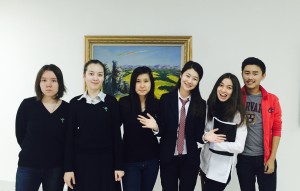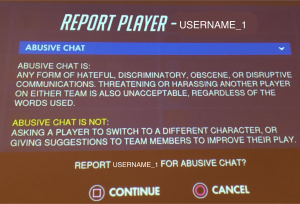Dialectic: Free Speech
September 3, 2018
In our recurring Dialectics, two authors with contrasting viewpoints discuss an issue of prominence in the local or broader community. We hope to use these multiple view stop provoke deeper thought among the student body and help readers explore new perspectives.
Winged Post: The first amendment protects “free speech,” but the exact meaning and extent of that protection has been hotly debated. As journalists, what does the first amendment mean to you?
Jin: The first amendment means to me that as a basis in this country we are allowed to report on anything within reasonable bounds as long as it’s not completely threatening or slandering someone. Then, there’s also the boundary of what’s morally correct and what your specific organization allows you to publish.
Kathy: For me the first amendment essentially guarantees the people a voice in five different aspects: press, speech, assembly, petition, and religion. I think that voice should only extend so far as to not infringe on others which as I read it is the subtext of the first amendment.
Winged Post: Many argue that the first amendment protects hateful speech. What, to you, classifies as “hate speech”?
Jin: Personally, I classify hate speech as anything that’s casting negative aspersions at people. However, I believe that even though it is hate speech, as long as you are just stating your opinion and nothing of bodily or emotional traumatic harm is coming of it, I think it should be able to be spoken out lawfully wise. Morally wise, I would disagree with that. If you can measure the emotional or physical trauma of it, it’s wrong.
Kathy: For me hate speech is any speech that is not backed by reasoning, is discriminatory, and is more than anything harmful, both physically or emotionally. The effects of hate speech limit other voices which in my opinion goes against the first amendment.
Jin: I feel, additionally, that the reasoning can often be flawed, so that sometimes people who do spread a lot of hate speech believe that they do have reasoning, so it’s hard to use that as a parameter.
Winged Post: This month, various social media platforms removed content from conservative/(far-right) radio host and conspiracy theorist Alex Jones in response to Jones’ posting of “hateful” content that violated company policies. To you, was this action an infringement of free speech or a removal of hateful speech?
Kathy: I would say that because a company is more or less a private domain that you sign an agreement with when you post things on their platforms, their actions and their decisions recently would classify more as removal of hateful speech to promote the environment that their company aims to create for themselves.
Jin: I would agree with Kathy. Additionally, because Alex Jones has been reported for giving death threats; that’s going against the first amendment itself, so there is no gray area in removing his content in my opinion.
Winged Post: Twitter stated when deactivating Alex Jones’s account that some of his posts had “violated their rules.” As private companies that hold sway over how information is shared, should social media platforms like Facebook and Twitter strive to guarantee users the same freedoms that the first amendment upholds or can they create their own rules and guidelines?
Jin: I think that they can create their own rules and guidelines. There’s multiple different platforms for different ideologies and groups of people. Twitter and Facebook seem so far to be for everyone and there are more specialized social medias. However, in general just not talking about those two which are the rather large ones, because they are owned by private companies and because you can choose whether or not to participate in that space, they should be able to make their own rules and guidelines.
Kathy: I think I more or less agree with that because as I see it, the role of social media is to create an ideal environment for expression whatever ideal means to that specific company. Since you do sign an agreement when you create an account or page on this particular platform, it makes sense and it is legally sound that the company should have the right to remove anything that takes away from or does not contribute to the environment that they are aiming to build. Of course, contrasting opinions and perspectives on issues should be welcomed, so that a diversity of conversation can be maintained within this environment of expression. At the same time, no one should feel threatened or in danger when browsing through social media.
This piece was originally published in the pages of The Winged Post on Aug. 31, 2018.


















![“[Building nerf blasters] became this outlet of creativity for me that hasn't been matched by anything else. The process [of] making a build complete to your desire is such a painstakingly difficult process, but I've had to learn from [the skills needed from] soldering to proper painting. There's so many different options for everything, if you think about it, it exists. The best part is [that] if it doesn't exist, you can build it yourself," Ishaan Parate said.](https://harkeraquila.com/wp-content/uploads/2022/08/DSC_8149-900x604.jpg)




![“When I came into high school, I was ready to be a follower. But DECA was a game changer for me. It helped me overcome my fear of public speaking, and it's played such a major role in who I've become today. To be able to successfully lead a chapter of 150 students, an officer team and be one of the upperclassmen I once really admired is something I'm [really] proud of,” Anvitha Tummala ('21) said.](https://harkeraquila.com/wp-content/uploads/2021/07/Screen-Shot-2021-07-25-at-9.50.05-AM-900x594.png)







![“I think getting up in the morning and having a sense of purpose [is exciting]. I think without a certain amount of drive, life is kind of obsolete and mundane, and I think having that every single day is what makes each day unique and kind of makes life exciting,” Neymika Jain (12) said.](https://harkeraquila.com/wp-content/uploads/2017/06/Screen-Shot-2017-06-03-at-4.54.16-PM.png)








![“My slogan is ‘slow feet, don’t eat, and I’m hungry.’ You need to run fast to get where you are–you aren't going to get those championships if you aren't fast,” Angel Cervantes (12) said. “I want to do well in school on my tests and in track and win championships for my team. I live by that, [and] I can do that anywhere: in the classroom or on the field.”](https://harkeraquila.com/wp-content/uploads/2018/06/DSC5146-900x601.jpg)
![“[Volleyball has] taught me how to fall correctly, and another thing it taught is that you don’t have to be the best at something to be good at it. If you just hit the ball in a smart way, then it still scores points and you’re good at it. You could be a background player and still make a much bigger impact on the team than you would think,” Anya Gert (’20) said.](https://harkeraquila.com/wp-content/uploads/2020/06/AnnaGert_JinTuan_HoHPhotoEdited-600x900.jpeg)

![“I'm not nearly there yet, but [my confidence has] definitely been getting better since I was pretty shy and timid coming into Harker my freshman year. I know that there's a lot of people that are really confident in what they do, and I really admire them. Everyone's so driven and that has really pushed me to kind of try to find my own place in high school and be more confident,” Alyssa Huang (’20) said.](https://harkeraquila.com/wp-content/uploads/2020/06/AlyssaHuang_EmilyChen_HoHPhoto-900x749.jpeg)











